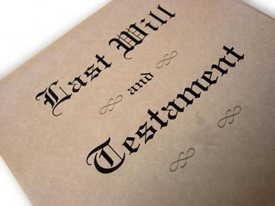LET OUR ESTATE PLANNING LAWYER IN PHOENIX, MESA, CHANDLER, PEORIA OR SCOTTSDALE, AZ HELP YOU TODAY.
What is Estate Planning?
Estate planning is the process of planning for your future so that when you become disabled and can’t take care of your own affairs or when you die, you have done the planning to make dealing with these events as easy as possible for your loved ones who will be handling everything. There are 2 ways to do this. One is will based estate planning and the other is trust based estate planning.
Will based Estate Planning:
When you have a will you name people who will take care of your minor children, if you have any, pay your final bills after you die and distribute your money the way you want it distributed. If you do not have a will, state law determines who gets your money and you may or may not like the way it gets distributed. In a will you can also name individuals to received a certain piece of property you own like a wedding ring or baseball card collection. You can also name any charities you would like to received money. If you don’t name the individuals or charities in your will, then they won’t get what you want them to get.
One thing to keep in mind is that a will does not go into effect until you die and must go through a process call Probate. Many of my clients think that because they have a will and they have named a personal representative to handle their money that this person can act for them while they are alive or that this will avoid probate. No matter whether you have a will or don’t have a will, your estate WILL go through probate when you die. Even if you die with a will, a court generally must allow others the opportunity to contest the will. Creditors are allowed to step forward; the validity of the will can be scrutinized; and the deceased’s mental capacity at the time the will was drafted can be questioned. These proceedings take time and money, and your heirs are the ones who will have to pay. Since probate proceedings can take up to a year or two, the assets are typically “frozen” until the courts decide on the distribution of the property. The entire process is made public for everyone to see your financial and personal matters, and the attorney fees can add up: appraisal costs, executor’s fees, court fees, legal and accounting fees, and surety bonds. Probate can easily cost 10% or more of the total estate value.
What if you become disabled? A will, will not help you at all. As I said earlier, a will does not go into effect until you die. If you want to give someone authority to act on your behalf if you are unable to, then you will need a financial power of attorney, a healthcare power of attorney and a living will. A financial power of attorney allows a person you have named to make financial decisions on your behalf. A healthcare power of attorney allows a person you have named to make financial decisions on your behalf if you are unable to. A living will is commonly referred to as the “pull the plug” document and allows your doctor to take you off of life support and allow you to die naturally if you are in a persistent vegetative state.
All of these documents are oftentimes more critical to have than a will because without them, you can face problems while you are still alive. If you don’t have these simple documents and you become unable to handle your own affairs a conservator and guardian will have to be appointed by the court to give this person the same powers you could have given them by having these simple documents. The cost of these documents is usually only a couple hundred dollars whereas the cost of going to court to have the same person appointed could cost thousands of dollars. This is all coming out of your estate, so it is taking away money that could be used for your care.
You may have told your loved ones that you do not want to be kept alive on life support if it looks like you are terminally ill and would not live if taken off of life support, but without a living will doctors will usually try to keep you alive at all costs. The most famous case of a what happens without a living will is the Terry Schiavo case. Terry Schiavo went into a coma and later a vegetative state at the young age of 27. Terry did not have a living will. Her husband wanted to take her off of life support because he said that was her wish. Her parents said she never would have wanted that so a 15 year legal battle ensued between her husband and her parents. This all could have been avoided with a living will that costs approximately $100.
Trust based Estate Planning:
Trust based estate planning starts with a revocable living trust. The main advantages of a living trust is that it has a built in disability management team if you become disabled since you name who you want to handle your financial affairs if you become disabled. The powers this person has is much stronger than if you just had a financial power of attorney. The reasons for that are unclear since according to the law a financial power of attorney is just as legally binding as a trust. However, we have seen many instances coast to coast where a bank or financial institution refuses to honor a power of attorney but will honor a trust and the people you have named in the trust. Since my job is to make sure you are covered in case something happens to you, this is the main reason I recommend trusts. Without a trust you may be faced with large legal costs to get a conservator appointed even though you had a financial power of attorney. Since the trust is designed to handle your financial affairs you will still need a healthcare power of attorney and living will with trust based estate planning. You will also avoid Probate if you have a living trust which could also end up saving your estate thousands of dollars.
To learn more about trusts read my article here.
What can happen if you don’t have a Trust?
The following letter is real. The names have been changed.
Michael’s Letter
Dear Steve,
When you married my mother, I could see how much she meant to you. It was the first time in a while that I felt Mom was going to be okay. She finally had someone to love her, to cherish her, and to provide for her. She deserved it. Over the years, I developed a great respect for you. I knew you would never do anything to hurt my mother. Imagine how surprised I was to find out just how much you did hurt her.
I know you didn’t hurt her intentionally. And, I am sure you would have done things differently if you had known how things were going to turn out. So, let me tell you what has happened since you died.
I know you never liked lawyers, and frankly, I don’t blame you. But because you refused to seek legal help during your life, we are now forced to seek legal help after your death. We have been forced to probate your estate. Do you know what probate is like? For starters, we couldn’t access your bank accounts or cash any bonds, until the probate was formally started. That took six weeks, six weeks that the phone bill, the electric bill, the gas bill, and the water bill could not get paid. I didn’t mind giving Mom the money, but if you could have seen the look on her face when she had to ask. I just know you couldn’t have intended that.
One of the requirements to get the probate officially started was that I apply for a bond. I had to pay several thousand dollars out of my own pocket to qualify to serve as executor of your estate. I understand that, even if you had one of those cheap store-bought wills instead of writing one on the free notepads from your local Realtor, the bond requirement would have been waived. It is not that I mind the money. I just know that you couldn’t have intended that.
Mom was in desperate need of some money once the probate finally started. Because she was not the only beneficiary of your estate, I could not ask for a spousal allowance to be made without reducing your other beneficiaries’ shares. I didn’t think that would be fair. I tried to ask the judge to make an early distribution to Mom of just a small part of the estate. Unfortunately, this couldn’t be done until two more months had passed. As soon as the two-month mark passed, I again made the request to the court. This time I was told that Mom would first have to be bonded (in case the court needed to ask for some of the money back). Because Mom didn’t have any assets of her own, the bond was denied. I was then told that Mom could have an early distribution if I made another request in two more months. Finally, just over six months after you died, I got a small, early distribution to Mom. It was just enough to get her by. It is not that I am not thankful that you left Mom some of your estate, I am. I just know that you couldn’t have intended that.
I thought it was such a nice gesture that you left your grandson some of your personal effects, especially since you and your son had never been very close. Because you grandson is under 18, however, we had to incur additional accounting and other expenses that generally could have been waived. This meant Mom got even less. I do not begrudge your grandson the bequest. I just know you couldn’t have intended that.
You promised me, when you asked if you could marry my mother, that you would protect her. Thank you for keeping your promise throughout your marriage. I know my mother treasures the years you spent together. She felt loved and safe and that was because of you. When you died, though, you broke your promise. And, I just know you couldn’t have intended that.
Yours sincerely,
Michael
HOW CAN I FIND OUT IF I SHOULD HAVE A TRUST?
I invite you to discuss your situation with me, and I will help you understand your estate planning options.
Call 480-809-1014 or email me to schedule an initial consultation. The initial consultation lasts one hour and the cost is $300.





